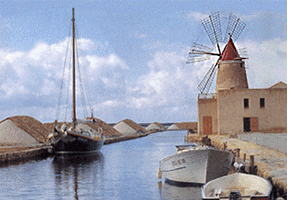...Best of Sicily
presents... Best of Sicily Magazine. ... Dedicated to Sicilian art, culture, history, people, places and all things Sicilian. |
by Ignazio Lo Verde | ||
Magazine Index Best of Sicily Arts & Culture Fashion Food & Wine History & Society About Us Travel Faqs Contact Map of Sicily |
Salt extraction was a technology known to the ancient Egyptians, and in Sicily dates at least from the time of the Greeks and Romans. It has flourished in the Trapani area unto the present day, not for a lack of "dry" salt deposits in Sicily (where there are several mines), but because many cooks prefer sea salt to that harvested from other sources. The windmills, however, were a medieval development. By the nineteenth century, Sicilian sea salt was exported to European countries as far away as Norway and Russia. Several of the British firms involved in other Sicilian exports, namely Marsala wine and sulpher, helped develop the international trade in sea salt. In Sicily, the sea salt is often sold wet or damp. For this reason a few grains of rice are sometimes placed with the salt in a shaker to absorb moisture and prevent caking. Trapani, ancient Drepanum, was the port for Erice, and the town's fortunes have always been tied to the sea. By the nineteenth century tuna had become an important product. It still is. Salt is just one part of the picture. An appetizing part, some would say. Nobody doubts the purity of Trapani's salt, but its trace elements give it a special flavour. It seems perfect for fish recipes like the seafood couscous for which Trapani is famous. The windmills are no longer necessary, but at least a few will continue to turn for years to come. About the Author: Professor Ignazio Lo Verde lectures on classics and architecture. | |
Top of Page |
 Trapani and Marsala are famous for more than wine and seafood. Trapani, in particular, boasts some of Europe's oldest salt marshes, and is still home to some of the windmills once used to drain water from the basins (containing ponds). Drawing salt from water remains a slow process, similar to desalination, something talked about more and more with the serious water supply problems confronting Sicily. The evaporation procedure utilises the flat marshlands of Trapani's coast and the long, dry Sicilian summers.
Trapani and Marsala are famous for more than wine and seafood. Trapani, in particular, boasts some of Europe's oldest salt marshes, and is still home to some of the windmills once used to drain water from the basins (containing ponds). Drawing salt from water remains a slow process, similar to desalination, something talked about more and more with the serious water supply problems confronting Sicily. The evaporation procedure utilises the flat marshlands of Trapani's coast and the long, dry Sicilian summers.